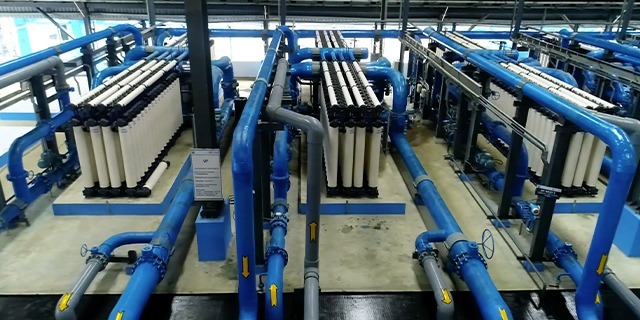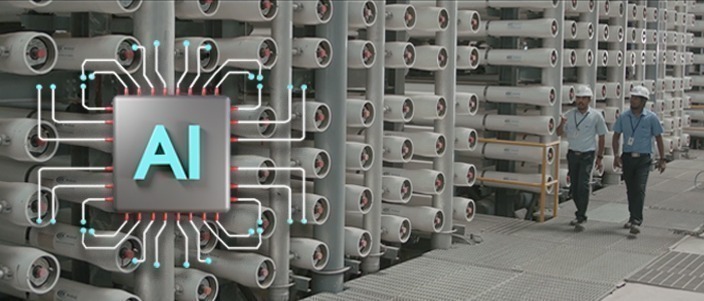Manufactured Water: Leading the Way in Water Sustainability
03 May 2024 Submitted by yaswanth Anantaneni

Manufactured Water: Leading the Way in Water Sustainability
Water scarcity has become a pressing global concern, impacting billions of individuals. With traditional water sources depleting and climate change exacerbating the situation, the need for innovative solutions to meet the rising demand for freshwater has become crucial. As humans, we cannot create water, only nature can. But what we can do is to produce purified water from unconventional sources such as wastewater, seawater, and industrial effluents, a concept that can be called as Manufactured Water.
This is considered to be a viable solution to address water scarcity challenges for several reasons. Firstly, it reduces dependence on traditional freshwater sources, thus reducing pressure on already stressed water supplies. Secondly, by utilizing non-traditional water sources, manufactured water helps to diversify water resources and reduce the impact on sensitive ecosystems. Additionally, manufactured water offers a reliable and consistent supply, irrespective of seasonal variations or geographical limitations.
Manufactured water is produced through various advanced treatment technologies that purify and remove pollutants and contaminants from non-potable water sources. These sources may include municipal wastewater, industrial effluents, brackish groundwater, and Seawater. The treatment processes involved can include ultra-filtration, reverse osmosis, advanced oxidation, disinfection, and pH adjustment. By employing multiple treatment stages, water can achieve potable quality that meets or exceeds regulatory standards.
Promoting Recycle & Reuse and Desalination:
Treated wastewater, once considered a liability, has now emerged as a resource in addressing the crisis in Bangalore, by supplying secondary treated water for non-potable purposes and replenishing drying lakes. It’s high time for us to understand the importance of water reuse and recognize it as a powerful tool in mitigating these challenges, offering a practical and environmentally responsible approach to water management.
In times of abundant supply, the significance of treated water often goes unnoticed. However, in situations like the current crisis, there’s no hesitation in utilizing treated water, as it becomes a necessity. It’s crucial for us to understand that wastewater treated with best practices and technologies can meet potable water standards. Despite psychological barriers, if not for drinking, treated water can still be utilized for various non-potable and household purposes.
One major challenge associated with Water Reuse lies in perception of using the treated wastewater, the acceptance of this relies heavily on public perception and the establishment of stringent regulatory frameworks. To ensure public trust, comprehensive education and communication campaigns are essential to inform communities about the treatment processes and safety standards applied during the process. Moreover, stringent regulations and monitoring programs must be in place to guarantee compliance with quality parameters and address any potential health concerns.
Desalination is another key aspect of manufactured water, particularly in regions where freshwater resources are scarce and have coastal access. It involves the removal of salt and other impurities from seawater, making it suitable for various potable and non-potable purposes. It is considered to be the most viable source for fresh water in coastal regions for potable, Industrial and other manufacturing purposes where highest quality water is essential for production. Desalination can be expensive in terms of CAPEX and OPEX compared to other conventional water sources, necessitating investment and cost optimization measures. But it is considered to be most effective option in the regions having coastal lines and are water stressed.
Current Applications & Going Forward:
Manufactured water is already being successfully implemented in several regions worldwide. For instance, the city of Windhoek in Namibia has got the world’s first-ever direct potable reuse plant in 2002, an achievement pioneered by WABAG, this state-of-the-art facility now fulfils a substantial 35% of Windhoek’s total water consumption, solidifying its reputation as a remarkable solution.
In India, cities facing severe water scarcity, such as Chennai, have embraced manufactured water as a sustainable solution. WABAG has played a significant role in implementing several projects in Chennai, including a 45 MLD Treatment and Tertiary Reverse Osmosis (TTRO) plant for industrial use, a 110 MLD desalination plant for potable consumption, and currently executing a 400 MLD desalination plant. Additionally, WABAG has built numerous facilities for various industries and utilities in India and globally, further demonstrating its expertise and contribution to water sustainability efforts.
Given the ongoing advancements in technologies and efforts for optimising CAPEX and OPEX, the adoption of manufactured water as an alternative is expected to increase. It has the potential to transform water management practices globally, especially in water-stressed regions, providing a reliable and resilient water supply for communities, industries, and agriculture.
Conclusion:
Manufactured water offers a promising solution to combat water scarcity India and globally by tapping into non-traditional water sources and employing advanced treatment technologies. With its potential for Water Reuse & Desalination, manufactured water represents a crucial step towards achieving water security in view of SDG 6. As we navigate the challenges of the future, the significance of manufactured water will continue to grow, playing a crucial role in securing access to clean water for future generations.







